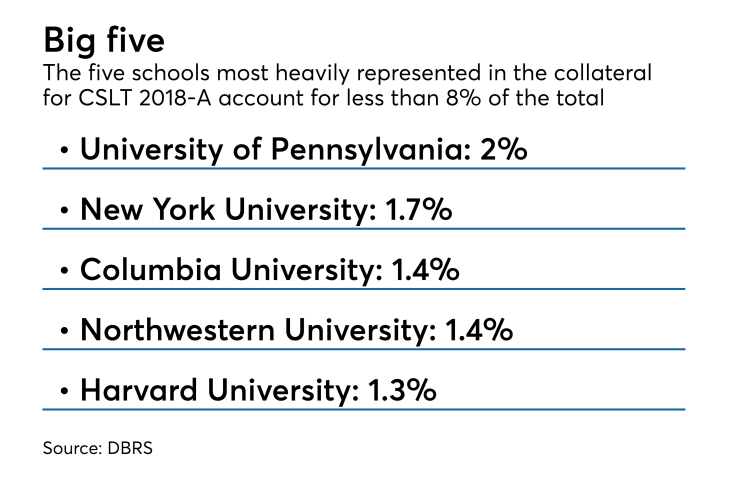CommonBond is taking its triple-A credit rating straight to the bank.
Earning a top grade from both Moody’s Investors Service and DBRS allowed the fintech lender to further lower its funding costs in the securitization market: On a weighted average basis, the company's latest offering of $234 million bonds were priced at a 27-basis-point improvement from its previous deal, in October, to yield 56 basis points over benchmark.
The transaction was CommonBond’s sixth and brings the amount of student loans that the company has securitized to over $1.2 billion. Goldman Sachs served as structuring agent, co-lead manager, book-runner and co-sponsor for this securitization. Barclays, Citi and Guggenheim Securities also served as co-lead managers and book-runners on the transaction.
Previously, Moody’s and DBRS had capped their ratings at double-A, primarily due to CommonBond’s short operating history – it has only been making loans to borrowers with advanced degrees and high-paying jobs since 2013.

“Achieving triple-A status in six deals is a testament to the high credit quality and operational strength that CommonBond brings to the securitization market,” said David Klein, the company’s CEO and co-founder.
Lower funding costs will help CommonBond to compete for borrowers with other triple-A- rated fintech lenders, as well as with banks that can rely on deposit funding. Social Finance, which has been operating longer and has more student loan bonds outstanding, earned its first triple-A in 2015; Earnest, another fintech lender, is able to issue triple-A-rated student loan bonds now that it has been acquired by Navient, a bigger company with a stronger balance sheet.
“As our credit spreads compress, it gives us the ability to keep rates competitive for the end consumer,” Klein said. “On our platform, because we made the jump to triple-A, spread compression has been a bit tighter than others on a relative basis. That has in part allowed us to manage the consumer’s weighted average coupon well.”
Two tranches of triple-A rated Class A notes will be issued: The floating-rate tranche pays 50 basis points over Libor and the fixed-rate tranche pays 50 basis points over interpolated swaps. The double-A rated Class B notes pay 80 basis points over swaps, and the single-A rated C bonds pay 120 basis points over swaps.
As a result of the triple-A rating, CommonBond was able to broaden and deepen our investor base, in terms of the number of investors, how much each investor is willing to buy in a particular deal and the excitement with which they come into a deal, Klein said.
“It allows us to take advantage of the full power of the capital markets,” he said.
The deal was placed across 21 investors, 12 of which had participated in prior deals and nine of which were new – including some investors that had never been active in student loans before.
Interestingly, given the rising interest rate environment, demand for fixed- and variable-rate tranches was almost identical, on a relative basis, to demand for the fixed-rate notes, Klein said. In the prior deal, it was more heavily skewed toward floating-rate notes.
Some of CommonBond's outstanding student loan bonds could also benefit from a ratings lift. On Feb. 9, Moody's placed six tranches issued on 2016 and 2017 vintage deals currently rated Aa2 under review for a possible upgrade, citing its "lower expectation of operational risk" of CommonBond.
This securitization follows a period of significant growth for the company. In 2017, CommonBond experienced a 250% increase in revenue year-over-year and surpassed its net income target by more than $4 million.
Through the end of 2017, the company experienced only two credit defaults. Independent of this securitization, Moody’s is reviewing six senior tranches in three CommonBond securitizations for upgrade.
“Our goal has always been to provide best-in-class product to both sides of our market: great debt-reduction options for consumers and robust capital deployment options for investors,” Klein said. “The strength of this transaction reflects our commitment to meticulous underwriting, minimal default rates, and high-quality assets. We expect to continue to programmatically issue high-performing bonds to a deep and broad investor base over time.”





